
The Bite of The Big Apple – an 8 hour documentary about the American dream; character driven, like a novel, and mixed on multiple tracks like an album.
Won the ACTRA award.
The Bedouins – a one-hour documentary that won the Ohio State award.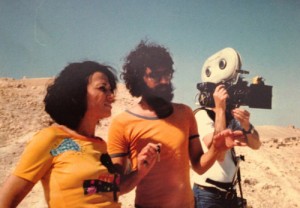
Desert Diaries – broadcast on CBC Morningside. Nominated for the ACTRA award.
My Jerusalem – a one-hour documentary. Nominated for the ACTRA award.
The Holocaust – a one-hour hour documentary. Nominated for the ACTRA award.
Joni Mitchell -a two-hour profile (1975). Nominated for the ACTRA award.
Joni Mitchell – a two-hour profile (1979). Nominated for the ACTRA award.
Pablo Casals – a one-hour interview broadcast on CBC series: Ideas
Leonard Cohen – a two-hour profile.
Music of Israel – a one-hour documentary
Music of Mexico – a one-hour documentary
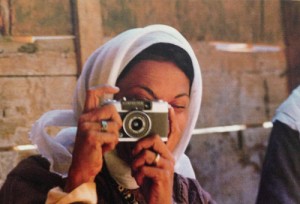 Jilles Vinault – a two-hour profile.
Jilles Vinault – a two-hour profile.
Nana Mouskouri – a two-hour profile.
Irving Layton – a two-hour profile.
Alden Nowlan – a two-hour profile.
by Patricia Holtz – Toronto Star
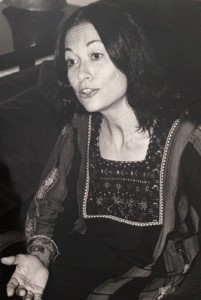 “I had my cards read in Los Angeles last month and the woman said to me, ‘Congratulations – you’ve just started a brand new cycle.’ And I said ‘Oh, no ! Not again.’” Malka laughs with enormous delight.
“I had my cards read in Los Angeles last month and the woman said to me, ‘Congratulations – you’ve just started a brand new cycle.’ And I said ‘Oh, no ! Not again.’” Malka laughs with enormous delight.
Malka is Malka Marom, but no last name is needed to identify her as one of the most talented folksingers to come out of the Yorkville era. If she says “not again” with such determination, it’s because the last 10 years have already taken her form a singing career to television reporting to her present job as a perceptive, highly professional radio producer.
“I switched to radio documentaries because I was not satisfied with what I was doing in television. I borrowed a tape recorder from Moses Znaimer and flew to Jerusalem. There, I interviewed Pablo Casals; and in the Sinai desert I interviewed members of various Bedouin tribes. ”
Diana Filer, then the executive producer of CBC Radio’s Concern series, listened to five minutes of Malka’s work and pronounced the content terrific. Ann Hunter, executive producer of CBC’s Special Occasion series, listened too and says now, still slightly dazzled at the memory, “She was instant good .”
Next, Malka did the now-legendary interview with Joni Mitchell. “I knew Joni before,” she told me, “I met her when she was performing at the Riverboat years before she was famous…
by David Livingstone
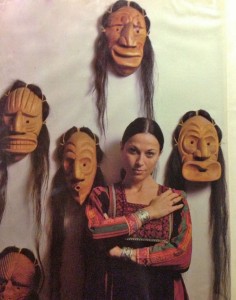 With a good pair of sunglasses, a tape recorder and the Arabic she had learned from a tutor at the University of Toronto, she went to the Sinai Desert, lived and roamed the desert with the Bedouins. The result, A Desert Diary, was heard on CBC.
With a good pair of sunglasses, a tape recorder and the Arabic she had learned from a tutor at the University of Toronto, she went to the Sinai Desert, lived and roamed the desert with the Bedouins. The result, A Desert Diary, was heard on CBC.
Before that, ACTRA honored A Bite of the Big Apple as the best program of 1977. The eight hour documentary, prepared, produced and recorded by Malka, chronicled the fate of Rockabye Hamlet.
When it comes to being interviewed, Malka insists on drawing lines. More than willing to discuss her career, she allows little truck with her private life: “I give everything I have to my listeners, to my viewers, to the public.”
Malka shoots for the larger scoop and gets it. “I’m interested in the creative process. This is what motivated me.”
“What is your idea of happiness, Joni?” “Are you married, Leonard?” Malka asks the questions softly, like someone trying to coax conversation from a baby bird. It’s part of her way of finding out how and why people create. “I like to relate intimately, just as I did with my singing. ” In raking up the mysteries of performers’ souls, she has achieved vivid, uninhibited portraits of people who may not have responded to a more disengaged approach.
Ron Solloway, head of CBC variety programming, offers a twofold explanation for her success. “There’s her technical skill, she’s an excellent editor, and a very empathetic woman. I think people enjoy talking to her and telling her things they wouldn’t tell anybody else.”
Dressed in jeans, a blouse and sandals, Malka has the kind of looks that in these post-liberation days are not supposed to matter. Sultry may sound hyperbolic, but isn’t. Her hair is dark and thick and hangs straight to her shoulders. Her eyes are dark brown. Her cheeks are perfect promontories; her mouth, ample; and her smile, radiant. Her throaty laugh keeps her beauty from being anything as persnickety as pristine. Now that Malka works in radio, people don’t often get to see her.
During her years as a singer, reviewers often paid as much attention to her visual as her vocal impact…
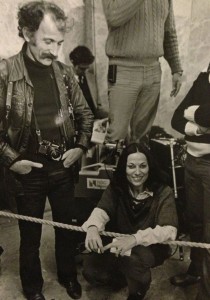 by Sid Adilman, Toronto Star
by Sid Adilman, Toronto Star
Eleven months ago, Toronto composer Cliff Jones took his Rockabye Hamlet musical to Broadway.
CBC-Radio broadcaster Malka and her trusty tape recorder were with the show every inch of the way, from tense auditions for the Charlottetown Festival version to the equally nervous collapse following deadly reviews.
Her Bite of the Big Apple, unlike Jones’, is a tantalizing, scrumptious blend of spicy backstage anecdotes, ruthless decision-making, constant back-biting, bitchiness, tears and laughter. Mostly though, it’s a salad of hopes and dreams so fragile that they can be rotted away by a single word or line of criticism.
Malka’s herculean effort – the most complete backgrounding of a show business endeavor ever undertaken by CBC Radio – runs eight hours. But it’s presented in four very accessible two-hour segments on Special Occasion.
This is A Chorus Line in alley clothes. Malka, virtually throughout, is the calm, objective questioner, the faceless microphone that mercilessly records everything. Hers is a real-life drama in three acts with a prologue…
by Myron Galloway
 Entitled A Bite Of The Big Apple, this extraordinary piece of radio journalism is the result of a year-and-a-half’s work on the part of singer-dancer-actress, Malka; that lady with the single name who gave up a highly successful singing career to become an award-winning creator of radio documentaries.
Entitled A Bite Of The Big Apple, this extraordinary piece of radio journalism is the result of a year-and-a-half’s work on the part of singer-dancer-actress, Malka; that lady with the single name who gave up a highly successful singing career to become an award-winning creator of radio documentaries.
“There are no heroes or villains in this piece,” Malka said. ” Everyone is presented as he behaved throughout the whole grueling experience.”
The result is radio-journalism at its most nakedly revealing.
The reality of the theatre was never like that, then… or now.
Reality is what we hear in Malka’s A Bite Of The Big Apple, full of uncertainty and doubt, where changes are made in cast, script, director and choreographer. Where personal loyalties go by the board as attitudes shift and the Broadway-bound killer instinct takes over. Where niceties of language are an almost unbearable tension holds everyone in a relentless grip as opening night approaches.
 “…There are very few survivors and we are all messengers… The most frightening thing that I remember is the thought that one would die without anyone knowing it…”
“…There are very few survivors and we are all messengers… The most frightening thing that I remember is the thought that one would die without anyone knowing it…”
The theme running though Malka’s evocative program is compellingly simple: the Holocaust, a seminal event in world history, must not be forgotten.
by Wilder Penfield
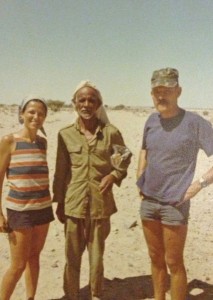 …if you tune in CBC Morningside for the next 10 days, you’ll have an extraordinarily visual experience.
…if you tune in CBC Morningside for the next 10 days, you’ll have an extraordinarily visual experience.
Malka, the former folksinger, who won an ACTRA Award for her complex, multi-layered, eight hour Bite Of The Big Apple, is introducing today a powerful project: a series of highlights from a tape-recorded diary she kept while she was living in the Sinai desert.
Her first person present tense makes this time-warp world seem remarkable here and now. “I’m not a scientist, just a human being who had a great opportunity and went along with it,” she told me the other day.
It was not, of course, actually that simple. She lived “like a Trappist monk”, preparing for months, studying the Bedouin customs and their Arabic dialect. “My research meant survival; mistakes can have great ramifications there.” she said.
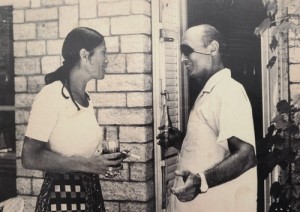 Malka conducted an exclusive interview with Moshe Dayan on the one year anniversary of the Yom Kippur War. This was the first interview General Dayan gave since he was investigated for the neglect to foresee the advent of that all out war and prepare for it.
Malka conducted an exclusive interview with Moshe Dayan on the one year anniversary of the Yom Kippur War. This was the first interview General Dayan gave since he was investigated for the neglect to foresee the advent of that all out war and prepare for it.
*** Commissioned and Broadcasted by CBC TV, and rebroadcasted later by other networks in other countries.
Photographed by a member of Malka’s TV crew at the conclusion of the interview which took place at Moshe Dayan’s home, in Zahalah, Israel.
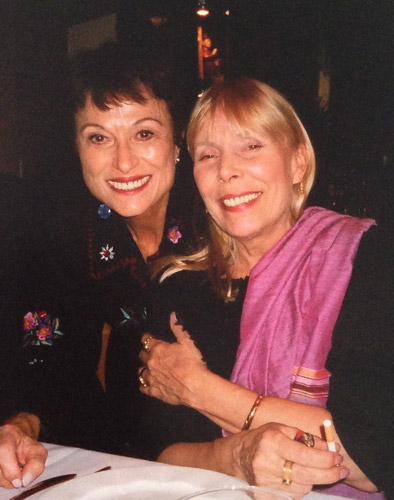
When singer, musician, and broadcast journalist Malka Marom was asked to interview musician, singer-songwriter, and artist Joni Mitchell in 1973, she eagerly accepted the opportunity to record a conversation with the young unknown performer she’d first met late one night in 1966 at an open mic in Yorkville and watched grow into a friend and ground-breaking artist. More recorded conversations followed over the next four decades, and it was only after Joni Mitchell and Malka Marom completed their last recorded interview that the broadcaster realised that she and Joni had been trying to pin down something so mysterious, it had eluded countless others since time remembered.
It being the creative process.
Undeterred by past failure, Joni and Malka tried to approach it from every possible angle or light that might offer a clue: life experience, childhood years, student years, running away from home, yearning to return home — also through love life, attempts to lure the muse, failures to lure the muse, working on the road in dive bars and festivals attended by more than half a million people, and also through poverty and affluence, ailments, glamorous triumphs, irretrievable loss, tragic mistakes…
Shared in the hope of inspiring and encouraging others, this book, told in interviews, lyrics, artwork, and photographs, is the intimate record of their pursuit of the mysterious something that has catapulted Joni Mitchell and her art into the great chain of artists who outlive their time.
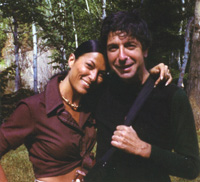 Malka was commissioned to interview the great poet/troubadour Leonard Cohen by the Canadian Broadcasting Corporation. Though Leonard Cohen agreed to participate the interviews he uttered not a word in reply to Malka’s questions. Then, while slipping his hand under her skirt, he explained: this is an honest true response… as are the poems… the rest is drivel.
Malka was commissioned to interview the great poet/troubadour Leonard Cohen by the Canadian Broadcasting Corporation. Though Leonard Cohen agreed to participate the interviews he uttered not a word in reply to Malka’s questions. Then, while slipping his hand under her skirt, he explained: this is an honest true response… as are the poems… the rest is drivel.
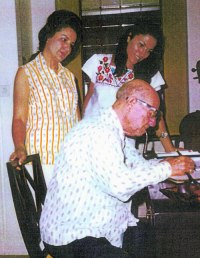
“…music, this marvelous, universal language, understood by everyone, everywhere, ought to be a source of better communication among men. This is why I make a special appeal to my fellow musicians everywhere, asking each one to put the purity of his art at the service of mankind for the peace we all desire and wait for.”
“…I do not feel that music or any form of art can be an answer in itself. Music must serve a purpose, it must be a part of something larger than itself, a part of humanity. More important than a musician’s music is his attitude toward life, nor can the two be separated.”
(from Malka interviewing Casals,” CBC radio)
***Malka interviewed Pablo Casals 3 months before he died at age 96. I was the last interview he offered.
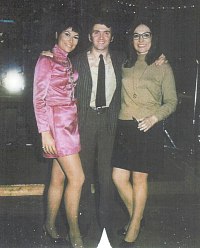
“I’ve always kept one ideal – being honest in whatever I sing, whatever I do.”
(From CBC profile of Nana Mouskouri by Malka Marom)
* the two, who met at the beginning of their respective careers remained lifelong friends and each one thought the other her native songs which both included in their respective repertoire.